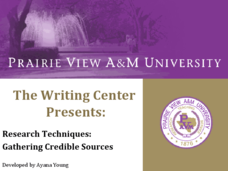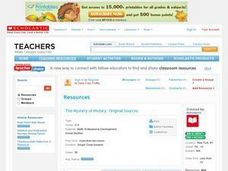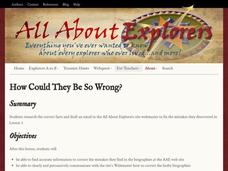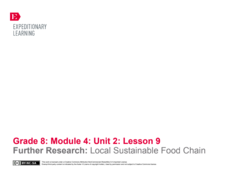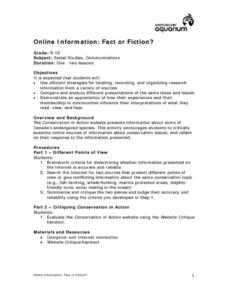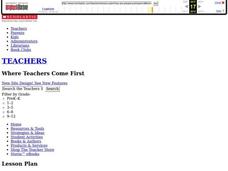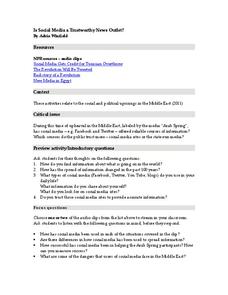Southern Poverty Law Center
Choosing Reliable Sources
It is more important than ever that 21st-century learners develop the skills they need to become savvy consumers of media. Young learners locate and identify reliable sources of information with a helpful media lesson.
Curated OER
Research Techniques: Gathering Credible Sources
How can you spot a credible source? What even makes a resource reliable in the first place? Answer some of these questions with this presentation. Although intended for higher education, this PowerPoint could be modified for middle...
TPS Journal
Sourcing a Document: The First Thanksgiving
How reliable is a painting of the first Thanksgiving if it was created 300 years after the fact? Learners assess the validity of a primary source image to determine what it can actually reveal about this event.
Curated OER
Who is the Expert? Exploring Credible Sources in Healthcare
How do you decide what sources are credible when researching online? Evaluate sources with a focus on researching health issues. After brainstorming common health concerns and how they would try to diagnose these problems, class members...
Curated OER
The Mystery of History-Original Sources
Young scholars research the events surrounding the Alamo in 1863, and explore the differences between primary and secondary sources of information. They brainstorm lists of items used to research a subject and categorize them as primary...
Calisphere
The 6 C's of Primary Source Analysis
Arm your class members with the six C's of primary source analysis—content, citation, context, connections, communication, and conclusions—and help them to establish a solid system for analyzing historical sources of information.
Curated OER
Thinking About Hate
This lesson starts out with a guided discussion about the statement "Birds fly in the sky; airplanes fly in the sky; therefore, airplanes are birds" and goes on to cover logical fallacies and reliable sources, relating these to the topic...
Newseum
Can I Trust the Creators?
It's easy to find information at the click of a mouse, but is it trustworthy? Pupils learn about the E.S.C.A.P.E. acronym for evaluating sources. Next, learners read a news story and evaluate its sources to determine credibility. Last,...
Teach Engineering
Energy Resources and Systems
We've talked a lot about energy, but where does energy come from? Pupils brainstorm different energy sources through a class discussion to kick off the 14th installment of a 25-part Energy Systems and Solutions unit. They then research...
All About Explorers
How Could They Be so Wrong?
If it's on the Internet, it must be true ... right? Introduce young Internet explorers to the importance of fact-checking through a fun web-based activity. Pairs work together to read and analyze biographies about world explorers, then...
Nemours KidsHealth
Media Literacy and Health: Grades 9-12
An essential skill for 21st-century learners is to know how to find reliable sources of information. Two activities help high schoolers learn how to determine the reliability of health-related news from websites, TV, magazines, or...
EngageNY
Further Research: Local Sustainable Food Chain
Researchers review how to create citations, find reliable sources, and paraphrase. Next, using guided task cards and their researcher's notebooks, they investigate the question they developed in instructional activity eight about the...
Curated OER
Online Information: Fact or Fiction
Discuss ways to determine if the information middle and high schoolers gather online is accurate. Using the Internet, they cite two sources that show conflicting points of view on a subtopic of conservation. They summarize and analyze...
Nemours KidsHealth
Media Literacy and Health: Grades 6-8
Internet suffers could drown in the volume of information available on line. Here's an activity that can be a lifeline and buoy confidence in middle schoolers' ability to find reliable information and credible sources. After reading...
Curated OER
CCC: Credible sources, Creative Commons Images, and Citing Your Sources
As part of a unit devoted to the study of autobiographies, this one-day library session focuses on developing research skills. Class members locate and properly cite a sketch of a Creative Commons image, as well as record the call...
Curated OER
Taming the Wild Wiki
Take a look at the credibility of online sources such as Wikipedia. Discussion points and handouts are included to facilitate a meaningful and informative dialogue. Tips are given on how to determine if a Wikipedia article is reliable...
Annenberg Foundation
America's History in the Making: Using Digital Technologies
How can digital technology of today link us to the events of the past? Scholars use technology to uncover the vast number of historical resources available in lesson 12 of a 22-part America's History in the Making series. Using databases...
California Department of Education
Where Am I Going?
How do I get where I'm going from here? The fifth of six college and career readiness lessons invites seventh graders to dig deep into the career of their choice. Once they complete their research, individuals relate their findings to...
Teaching Tolerance
Understanding and Evaluating Online Searches
With billions of options to choose from, how can people determine which online sources are reliable? Using an informative resource, pupils first discuss and evaluate a sample search result handout. Next, partners create a checklist for...
Curated OER
How to Locate and Evaluate Information, Part I - Online Catalog
Using the online catalog, researchers locate and record on a citation template specific sources for their research paper. A library specialist models searching strategies while the teacher introduces the research paper process. Daily...
Curated OER
How are People Portrayed by Different Media?
Your 9th - 12th graders can hone their analysis and critical thinking skills by studying the way a subject is portrayed across media types. They examine how various print, visual, and online sources have portrayed key players in the 9/11...
American Chemical Society
Curious Crystals
Crystals are more than meets the eye! Can learners tell them apart simply by observation? As they examine five samples with a magnifier, they find that appearance alone is not enough. This serves as an introduction to a mini unit on...
Curated OER
Is Social Media a Trustworthy News Outlet?
Examine the role of social media in social and political uprisings. Pupils listen to NPR audio clips about social media and the Arab Spring and read an article that proposes the idea that revolution will not happen through social media....
Curated OER
I Heard It 'Round the Internet: Sexual Health Education and Authenticating Online Information
Students evaluate websites regarding sexual health information. In this media awareness lesson, students discuss facts and myths regarding sex as they determine how to find reputable online and print resources.



